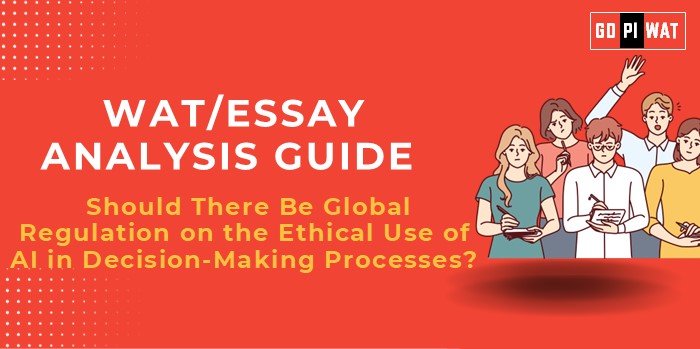📋 WAT/Essay Analysis Guide: Should There Be Global Regulation on the Ethical Use of AI in Decision-Making Processes?
🌐 Understanding the Topic’s Importance
The rapid growth of AI, with its potential for both revolutionary advancements and ethical pitfalls, necessitates an exploration of global regulations to ensure fair, transparent, and accountable decision-making processes.
⏱️ Effective Planning and Writing
- 📝 Time Allocation:
- Planning: 5 minutes
- Writing: 20 minutes
- Review: 5 minutes
- 💡 Preparation Tips:
- Gather recent data (e.g., AI Act, UNESCO standards).
- Note stakeholder roles and ethical challenges.
💡 Introduction Techniques for Essays
- 🔄 Contrast Approach: “While AI is driving groundbreaking advances in personalized healthcare, unchecked biases in algorithms highlight an urgent need for ethical oversight.”
- 🛠️ Solution-Based: “Global regulation is the cornerstone for fostering innovation while ensuring AI’s ethical use across industries.”
📖 Structuring the Essay Body
- 🏆 Achievements:
- Highlight successes like AI-driven medical diagnoses and fraud detection.
- Use examples like GDPR’s AI provisions.
- ⚖️ Challenges with Comparative Analysis:
- Discuss ethical gaps, with examples such as the EU vs. China’s AI ethics stance.
- 🌟 Future Outlook:
- Suggest steps like global AI councils or cross-border agreements.
📄 Concluding Effectively
- ⚖️ Balanced Conclusion: “Global AI regulation must strike a balance between fostering innovation and upholding ethical standards to create a trustworthy technological future.”
- 🌍 Global Comparison Conclusion: “As AI reshapes industries, nations must collectively ensure that its growth aligns with global ethical standards.”
🔍 Recommendations for Sustainable Progress
- 🌐 Establish a UN-led AI ethics council.
- 💡 Incentivize ethical AI innovation through international grants.
- 🤝 Promote public-private partnerships to address ethical gaps.
✍️ Sample Short Essays
Balanced Perspective: “Global AI regulation offers a path to equitable and transparent decision-making, provided it accommodates regional innovation needs.”
Solution-Oriented: “A robust global framework for AI ethics is vital to mitigate bias and promote accountable decision-making.”
Global Comparison: “The EU’s AI Act provides a benchmark for ethical standards, urging other nations to adopt similar measures for a cohesive approach.”


